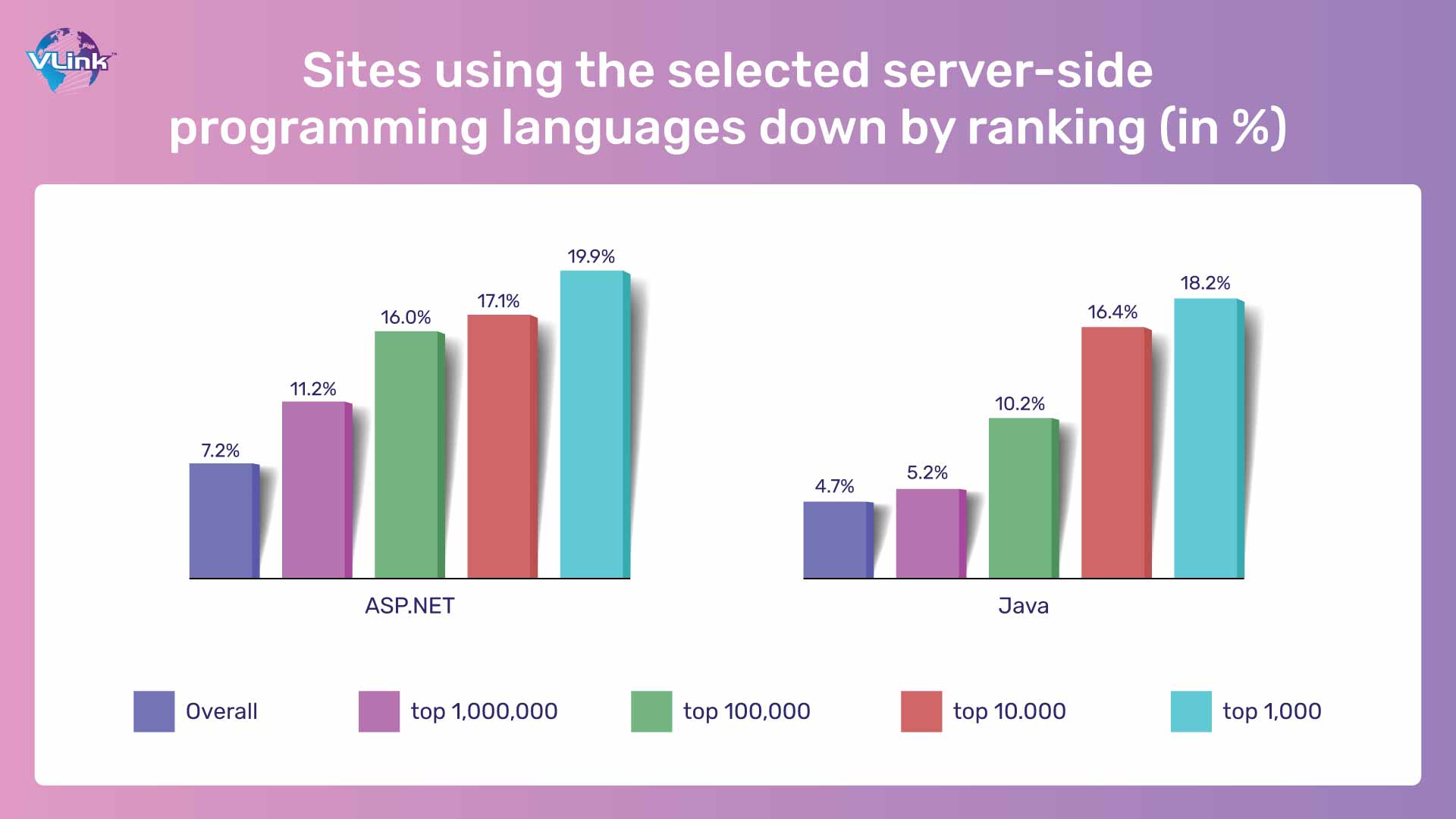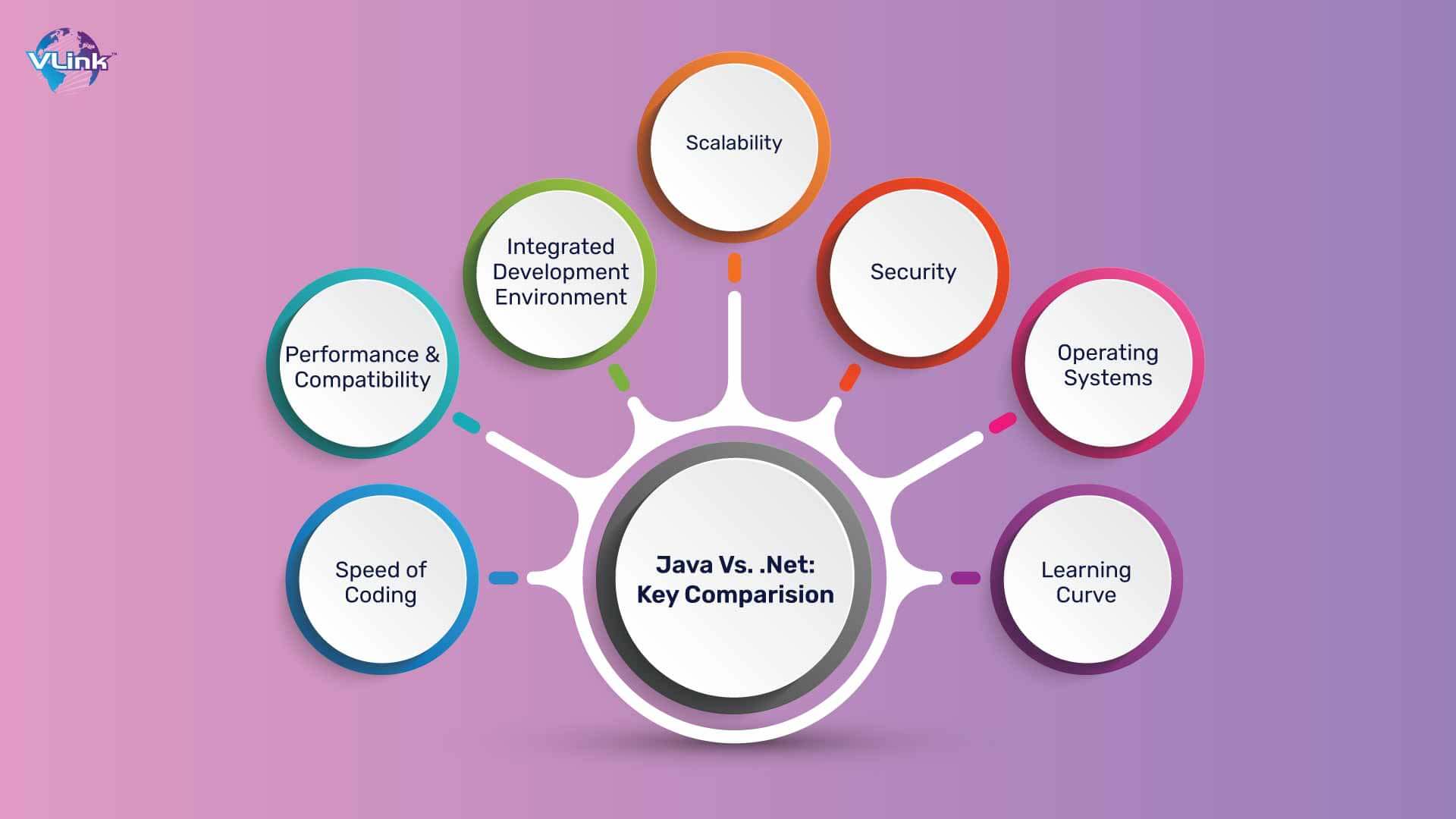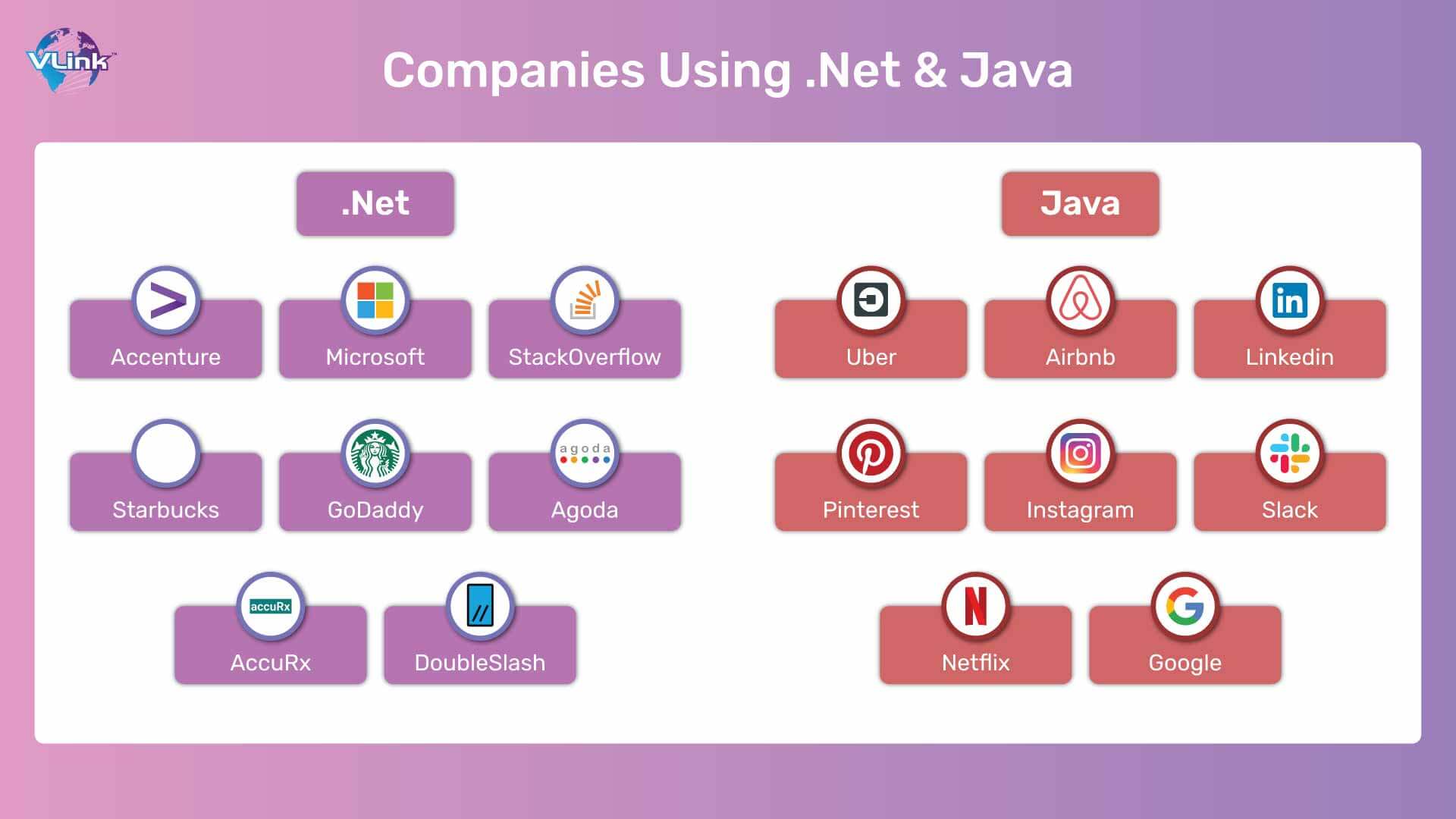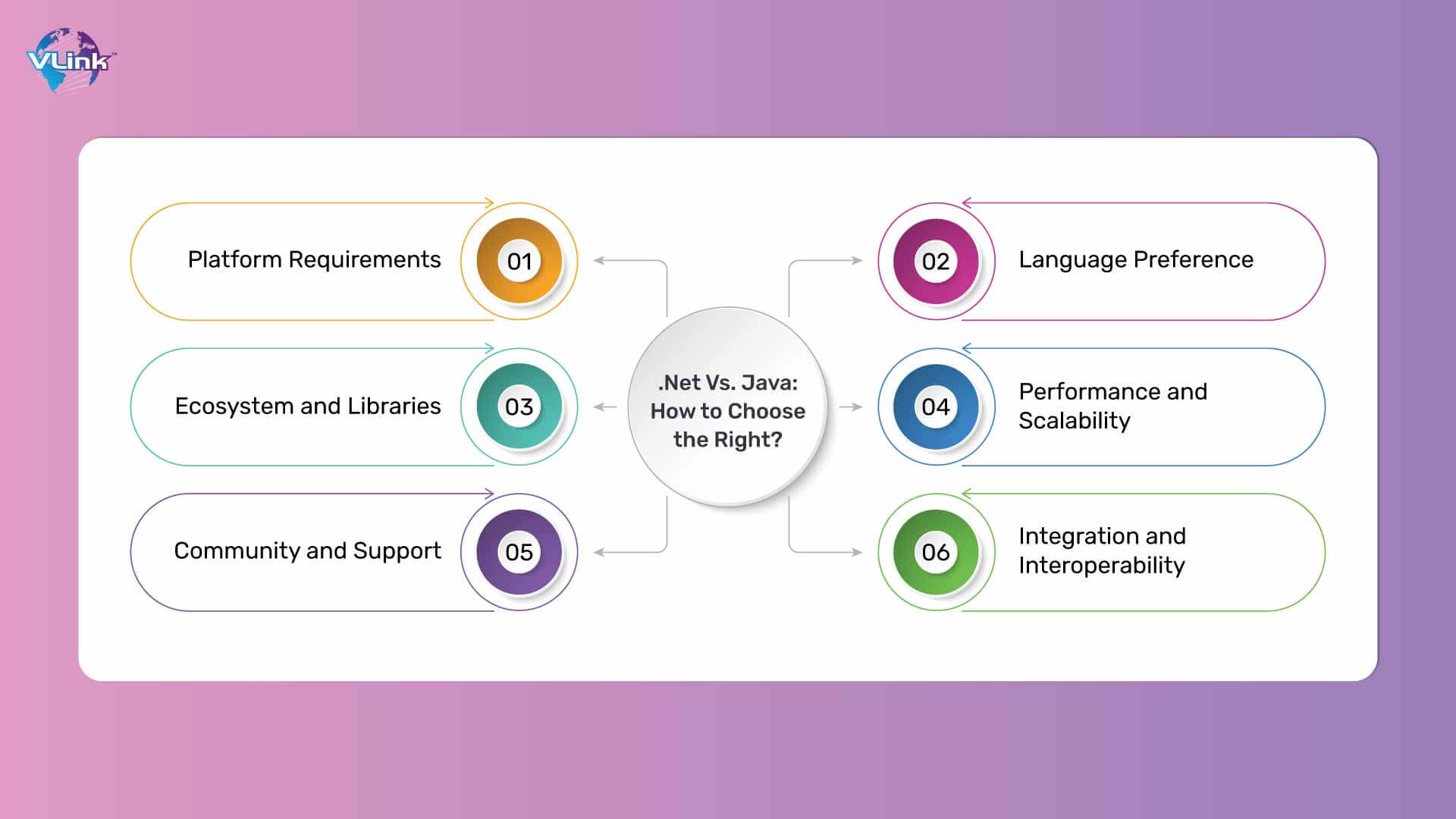When it comes to choosing the best programming languages for your project, you'll see several options in the market. Java and .Net are two of the top rivals in the software development fields.
Selecting the right one between Java and .Net is a challenging task. After all, both help developers create robust, scalable, and high-performing software. The market usage of Java and .Net is shown in (%).

The performance & quality of your software depends on the technology you choose to build it. In this blog, you will explore different factors to decide the right one for your project in 2024: Java Vs .Net.
Let's start with its basic definition.
What is Java?
Java is a widely used, high-level, object-oriented programming language. It’s most popular for enterprise-level software, web apps, large-scale systems and mobile app development solutions (Android apps are primarily written in Java).
Java is platform-independent, meaning that Java programs can run on any device or operating system that has a Java Virtual Machine (JVM) installed. This is achieved through the "write once, run anywhere" (WORA) principle, where Java code is compiled into bytecode, which can be executed on any device that has a compatible JVM.
These are reasons why should you hire Java developers in United States.
What is .Net?
.NET is a free, open-source, cross-platform framework developed by Microsoft for building various types of applications, including web applications, desktop applications, mobile applications, cloud-based applications, and more. It has a comprehensive ecosystem that provides tools, libraries, and languages for developing software across different platforms and devices. That’s why should you hire .Net developers.
Java Vs .Net: Key Features
Features | Java | .Net |
Programming Languages | Java programming language as well as Kotlin and Scala | C#, Visual Basic .NET (VB.NET) |
Platform Independence | Can run on any platform | Tied to the Windows platform |
Runtime Environment | Run on the Java Virtual Machine (JVM) | Run on the Common Language Runtime (CLR) |
Development Tools and Ecosystem | Rich ecosystem of tools and libraries | A strong ecosystem of development tools |
Community and Adoption | A large and mature community | A significant community, particularly for Windows-based applications |
Java Vs .Net: Pros & Cons
Java: Pros & Cons
Pros | Cons |
Object-Oriented programming language | Memory consuming |
Distributed computing |
|
Secure language |
|
multi-threaded |
|
.Net: Pros & Cons
Pros | Cons |
Flexible deploymemt | Memory leaks |
Easy maintenance | Complex migration |
Great caching system | Stability issues for new release |
Cross-platform design |
|
A Detailed Comparision: Java Vs .Net
Factors | Java | .Net |
Coding Speed | Optimized coding, but long final code length | .NET’s components can be used again to increase speed. |
Supported Language | Groovy, PHP, Ruby, Python, Java, JavaScript, and many more | Supports over 20 languages like C#, VB.NET, C++, .NET, PHP, Ruby & more |
Runtime | JVM | CRL |
Supported IDE | Eclipse, Oracle JDeveloper, Oracle NetBeans, and Intellij Idea | Microsoft Visual Studio, MonoDevelop, Rider |
Operating Systems | Multiple | Windows |
Cross-Platforms |
|
|
Unit Testing | JUNIT | JUnit and Microsoft Unit Testing Framework |
Web Applications & Frameworks | Spring Boot and Spring | Spring.NET and ASP.NET MVC |
Popularity | Java specialists are in more demand | .NET developers are fewer in number |
Security | Java had issues with its security features | It’s an open source. |
Performance | Java offers a lot of tools that scale the performance. | .NET is faster than Java |
Community Supports | 11.6k stars & 2.9k stars and forks respectively on GitHub | 12.6k stars and 2k stars and forks respectively on GitHub |
Architectures | Supports connected architecture | Supports disconnected architecture |
Key Comparision: Java Vs .Net

Java Vs .Net: Speed of Coding
Java developers use several threads to make handling and processing sequences of instructions easier. On the other hand, .Net is an absolute leader in terms of coding speed.
.Net is an object-oriented technology with reusable elements that produce the same app.
Who is the Winner in Terms of Coding Speed?
.Net is less time-consuming than Java. So, it's fair to say that .Net is the winner in terms of coding speed.
Java Vs .Net: Performance & Compatibility
As Java is a developer-centric platform, there is no need for code conversion.
Java is known for its portability and performance. With modern JVMs and optimization techniques, Java applications can achieve high-performance levels, especially for server-side and enterprise applications. Java's compatibility is primarily focused on platform independence.
.NET Core was designed with performance in mind, offering optimizations and improvements over previous versions of the framework. .NET applications can achieve comparable performance to Java, especially for web servers, microservices, and cloud-native applications. .NET's compatibility is primarily centered around Windows-based environments.
Who is the Winner in Terms of Performance & Compatibility?
Both Java and .Net offer strong performance and compatibility, with each having its strengths and considerations.
Java Vs .Net: Integrated Development Environment
IDEs (Integrated development environments) help developers code, test software apps, and maintain documentation.
There are four most popular Java IDEs & Editors: Oracle NetBeans, Eclipse, IntelliJ Idea, and Oracle JDeveloper. These IDEs can also be customized and made into built-in plugins.
On the other hand, .NET comes with several IDEs such as JetBrains Rider, & Microsoft Visual Studio IDE. Visual Studio includes a large set of integrated development environments that help build all types of apps using its functionalities.
Who is the Winner in Terms of IDEs?
Both Java and .NET ecosystems offer robust IDEs as per their respective platforms, with options ranging from feature-rich, integrated environments like Eclipse and Visual Studio to lightweight, customizable editors like IntelliJ IDEA and Visual Studio Code.
Java Vs .Net: Scalability
If you are planning to build large-scale applications and enterprise-level software, both Java and .Net are equally effective.
Who is the Winner in Terms of Scalability?
Both offer robust capabilities for building scalable applications, with Java having a long history and a mature ecosystem in enterprise settings. At the same time, .NET provides modern tools and technologies for cloud-native and microservices architectures.
Java Vs .Net: Security
Java employs a single language across all platforms to build apps on a wide range of operating systems. It can handle other languages such as Python, Ruby, Kotlin and Groovy.
On the other hand, the .Net may support languages such as C# and C++ for backend development and web services. As it supports over 20 languages, you can build software in the language you want, including VB.NET, C#.NET, Perl, and many more.
Who is the Winner in Terms of Security?
Both Java and .NET provide robust security features and mechanisms for developing secure applications.
Java Vs .Net: Operating System
Java is platform-independent, running on any system with a Java Virtual Machine (JVM), including Windows, macOS, Linux, and others.
.NET, initially closely tied to Windows, has expanded its support through .NET Core and later versions, now offering cross-platform compatibility with Windows, macOS, and Linux.
Who is the Winner in Terms of the Operating System?
Both ecosystems support various operating systems, but Java historically has more robust cross-platform capabilities.
Java Vs .Net: Learning Curve
Both technologies are easy to learn, but Java offers more educational and documentation material to study, which is viewed by a larger user community available on the market so that it can be a little overwhelming.
On the other hand, the .Net framework is comparatively easy. At the same time, the educational and documentation material provided by Microsoft continues to attract new support.
.Net vs Java: Which is Better?
When Hire your Next Java Developers?
- Building Windows-centric applications or integrating with Microsoft technologies.
- Developing enterprise-level web applications with ASP.NET.
- Employing a robust and scalable framework for server-side development.
- Utilizing the power of C# language for rapid development.
- Developing desktop applications with WPF or WinForms.
When Hire .Net Developers?
- Creating platform-independent applications.
- Building large-scale, distributed systems with scalability and performance in mind.
- Leveraging a vast ecosystem of libraries and frameworks like Spring and Hibernate.
- Developing Android mobile applications.
- Utilizing Java's strong support for multithreading and concurrency.
Companies Using .Net & Java

.Net Vs. Java: How to Choose the Right?

Here are several factors to consider the right for your business between .Net and Java:
Platform Requirements:
If you're developing primarily for Windows environments, .NET may be more suitable due to its seamless integration with Microsoft technologies. For platform independence, Java is preferred.
Language Preference:
.NET uses languages like C# and VB.NET, while Java uses Java. If you prefer a particular language or if your team is more proficient in one language than the other, it can influence your choice.
Ecosystem and Libraries:
Consider the number of libraries, frameworks, and tools to find the right one between Java and .Net.
Java has a vast ecosystem with frameworks like Spring and Hibernate and popular libraries in Java like Apache Commons, Google Guava & Jackson.
On the other hand, .NET offers ASP.NET for web development and Unity3D for game development.
Performance and Scalability:
Both platforms offer strong performance and scalability. Evaluate specific requirements and benchmarks to determine which platform aligns better with your project's needs.
Community and Support:
When it comes to choosing the right one between Java and .Net, it’s essential to consider the availability of community support, documentation, and resources.
Both .NET and Java have large and active communities, but the extent may vary depending on your location and specific needs.
Integration and Interoperability:
If your project needs to integrate with other systems or technologies, consider the ease of integration and interoperability capabilities of each platform.
Hire Developers for Java and .Net Development Solutions at VLink!
Whether you need developers for Java or .Net development solutions, VLink will help to cover all. We have an extensive network of talent in both Java and .Net technologies. With our streamlined hiring and rigorous pre-vetting process, you will hire the top 3% of developers in just two days.
For more information about Java and .Net developers, contact us!
Frequently Asked Questions
Both Java and .NET are versatile, object-oriented programming platforms with solid support for enterprise-level development, robust ecosystems of libraries and frameworks, and cross-platform capabilities.
The cost to hire Java programmers depends on factors like location, experience level, and project needs. On average, hourly rates range from $30 to $150, with senior developers commanding higher rates.
The cost to hire .NET developers can vary depending on factors such as location, experience level, and project complexity. On average, hourly rates range from $30 to $150. Senior developers with extensive experience may command higher rates.
If you want to hire Java developers within two days, contact VLink. A dedicated IT staffing company with an extensive network of talent. Through its streamlined hiring approach and rigorous pre-vetting process, you can hire Java programmers within 48 hours.
Both Java and .NET are commonly adopted for enterprise-level business solutions. However, Java is often preferred for its platform independence and extensive ecosystem, while .NET excels in Windows-centric environments.














